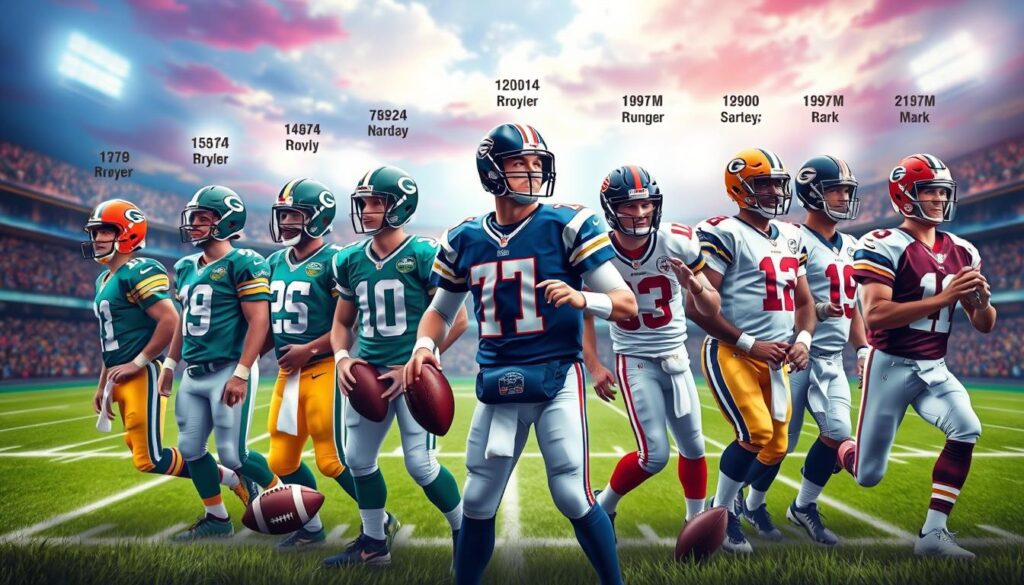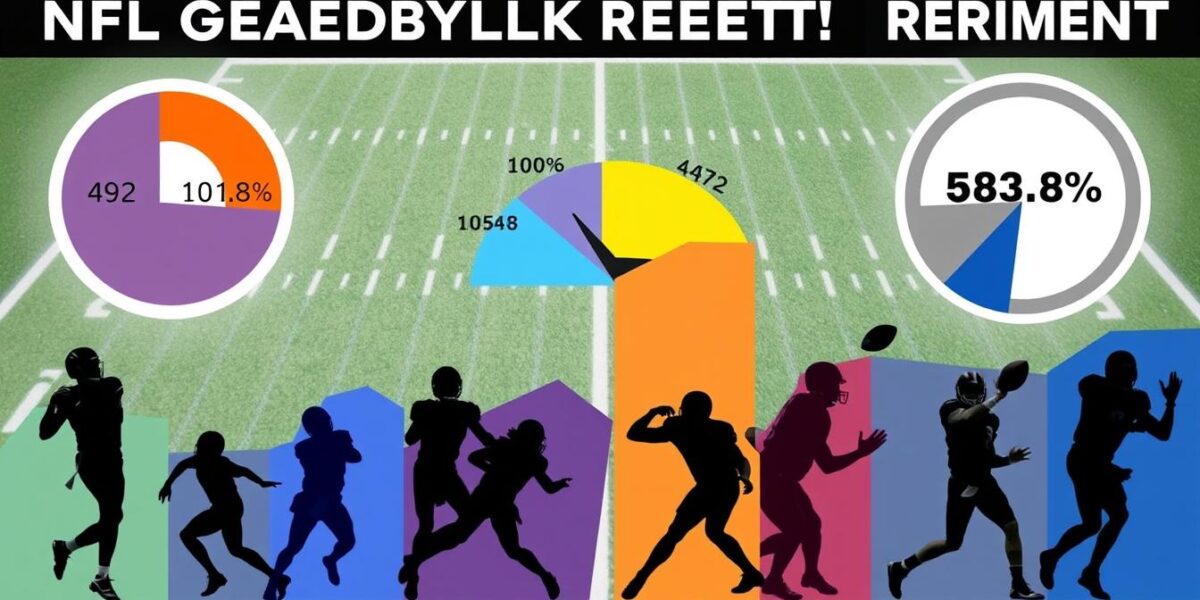Discover the average starting QB retirement age in the NFL and learn how long professional quarterbacks typically play before hanging up their cleats for good
What is the average starting QB retirement age? I’ve always been fascinated by the NFL’s top quarterbacks and their careers. The league’s tough competition and physical demands often lead to early retirements. This leaves us wondering, “What could have been?” A study by RBC Wealth Management found that the average retirement age for NFL starting quarterbacks is just 27.6 years old.
This fact highlights how short a professional football career can be, especially for quarterbacks. While players like Tom Brady and Kurt Warner have defied age, they are the exceptions. Most NFL careers, especially for quarterbacks, are much shorter than in other sports.
Key Takeaways
- The average retirement age for NFL starting quarterbacks is just 27.6 years old.
- NFL careers have the shortest average longevity among the four major sports leagues in the U.S.
- Positions like running backs, linebackers, and linemen typically face more physical strain and retire earlier.
- Notable early retirees include Andrew Luck, Tiki Barber, and Calvin Johnson.
- Quarterbacks who defy the odds and play into their late 30s or 40s, like Tom Brady, are the exceptions.
Understanding NFL Quarterback Career Spans
The NFL is tough, and quarterback careers are often short. These athletes face challenges that limit their time on the field. Let’s look at what affects how long quarterbacks play in the NFL.
Physical Demands on NFL Quarterbacks
Quarterbacks are key in any offense. They make quick decisions and take hits from pass rushes. They need to be smart and strong to dodge defenders and take hits.
Impact of Modern Training Methods
New sports science and recovery methods help quarterbacks last longer. Teams spend a lot on top training, nutrition, and recovery. This keeps quarterbacks healthy and playing well for years.
Evolution of QB Protection Rules
The NFL wants to keep its quarterbacks safe. It has made rules to reduce hits and penalties. This includes penalties for hits to the head and more calls for roughing the passer.
| Quarterback | Career Length | Key Achievements |
|---|---|---|
| Tom Brady | 23 seasons | 7 Super Bowl wins, 5 Super Bowl MVPs, 3 league MVPs |
| Patrick Mahomes | 6 seasons (so far) | Super Bowl win, Super Bowl MVP, 1 league MVP |
| Emlen Tunnell | 14 seasons | NFL’s career leader in interceptions (79) and interception return yards (1,282) |
Quarterback careers in the NFL are changing. The game’s demands, better training, and safety rules all play a part. As the NFL evolves, we’ll see more changes in how long and well quarterbacks play.
Average Starting QB Retirement Age in the NFL
The average age of NFL quarterbacks is 28.4 years. However, starting QBs tend to retire later. This is an interesting fact.
Players like Aaron Rodgers have played into their 40s. Rodgers, now 41, is the oldest active quarterback. He shows that quarterbacks can play long careers.
On the other hand, young players like Anthony Richardson start at 22. This range shows the varied careers of quarterbacks. It highlights the different ages and career lengths of quarterbacks.
| Position | Average Age | Players Over 30 |
|---|---|---|
| Quarterback | 28.4 years | Aaron Rodgers (41), Tom Brady (45) |
| Running Back | 25.45 years | Less than 5% active |
| Wide Receiver | 26.03 years | Adam Thielen (34) |
| Tight End | 26.7 years | Marcedes Lewis (40+) |
| Offensive Line | 26.64 years | 11% over 30 |
| Defensive Line | 27.03 years | 21% over 30 |
| Linebacker | 26.33 years | Nick Bellore (35) |
| Defensive Back | 25.93 years | Harrison Smith (35), Stephon Gilmore (34) |
| Long Snapper | 30.65 years | N/A |
| Kicker | 29.02 years | N/A |
| Punter | 28.51 years | N/A |
The data shows quarterbacks have longer careers than other NFL players. The exact starting quarterback retirement age is not given. But, it’s clear many top quarterbacks play well into their 30s and 40s.
Factors Influencing QB Career Longevity
The length of a quarterback’s (QB) career in the NFL is shaped by many factors. Knowing these can help us understand the challenges and considerations of the qb playing career length and starting quarterback shelf life.
Playing Style and Injury Risk
A quarterback’s style can greatly affect their injury risk and career length. Mobile QBs, who use their speed and agility, are more likely to get hurt. They might suffer from sprains, fractures, or concussions due to more contact.
On the other hand, pocket passers, who focus on their throwing, might face less injury risk. Yet, other factors can still limit their starting quarterback shelf life.
Team Support Systems
The strength of a team’s support system is crucial for a quarterback’s career. A solid offensive line can protect the QB and reduce injury risk. Good coaching and a well-designed offense can also help a QB perform better.
Proactive medical care and rehabilitation programs are key to helping QBs recover and extend their careers.
Contract Considerations
The terms of a quarterback’s contract can also impact their qb playing career length. Teams must weigh a QB’s performance, potential, and financial cost when negotiating contracts. Shorter-term deals might encourage QBs to keep playing, while longer-term contracts can offer stability but limit roster flexibility.
Understanding the many factors that influence a quarterback’s career is essential. It requires looking at physical, team-based, and contractual aspects of the NFL quarterback position.
QB Age Distribution in Current NFL
The NFL quarterback age distribution is quite wide. It ranges from young starters in their early 20s to older veterans in their late 30s and early 40s. This shows how long and resilient the careers of top quarterbacks can be, proving that nfl qb careers don’t have to be short.
At the older end, we see stars like Aaron Rodgers (41), Joe Flacco (39), and Josh Johnson (38) still leading their teams. They have a lot of experience and skill. These players have gone beyond the pro bowl qb retirement age that used to be the standard, setting new records for how long quarterbacks can play.
On the other hand, the league is seeing more young, talented quarterbacks making a big impact. Players like Patrick Mahomes (27), Jalen Hurts (24), and Justin Herbert (25) are the new faces of nfl qb careers. They show the league’s focus on growing and supporting the next generation of quarterbacks.
Most starting quarterbacks are between 28 and 32 years old, which is the peak of their careers. This mix of young talent and seasoned veterans shows how the quarterback role is changing. It’s now about combining youth and experience for success in today’s game.

The pro bowl qb retirement age keeps going up, making the NFL’s quarterback scene even more interesting. Each player brings their own special qualities to the game, making it more competitive and exciting.
Historical Trends in QB Retirement Ages
The length of NFL quarterbacks’ careers has changed a lot over the years. In the past, careers were shorter because of less advanced medical care and training. But, the position has seen big changes that have made top quarterbacks play longer.
Past Decades Analysis
In the 1970s and 1980s, starting quarterbacks retired around 32 years old. Players back then faced more injuries and didn’t have modern sports medicine. This made their careers shorter.
Notable Career Length Changes
Several factors have helped quarterbacks play longer. Better protection rules and offensive strategies that focus on passing have helped. Also, new training methods and sports science help players handle the physical demands of the game.
Evolution of the Position
The quarterback role has changed from just managing the game to being more dynamic playmakers. This change has made modern quarterbacks play well into their 30s. For example, Tom Brady played for 23 seasons and won 7 Super Bowls.
The way quarterbacks retire has changed a lot over time. This change shows how the quarterback position and the sport are evolving. It will be interesting to see how future quarterbacks extend their careers even more.
Peak Performance Years for NFL Quarterbacks
The peak years for NFL quarterbacks show an interesting trend. While individual peaks can vary, many quarterbacks tend to reach their prime in their late 20s to early 30s. This time is when they have both physical skill and experience, leading to top-notch performances.
But, Tom Brady has changed the game with his longevity. He has played at a high level well into his 40s. This shows that the idea of a “peak age” might not always be true.
| Quarterback | Games Played in 2023 | Completion Percentage in 2023 |
|---|---|---|
| Lamar Jackson | 18 | 66.5% |
| Josh Allen | 19 | 66.7% |
| Patrick Mahomes | 20 | 67.7% |
| Jared Goff | 20 | 67.6% |
| Matthew Stafford | 16 | 63.0% |
| Dak Prescott | 18 | 69.4% |
| Brock Purdy | 19 | 67.8% |
| C.J. Stroud | 15 | 63.9% |
The data shows that while many quarterbacks retire in their early to mid-30s, their peak years are often later. The game is always changing, so what we consider a quarterback’s prime might change too.

Comparing QB Longevity to Other Positions
Quarterbacks have a big edge when it comes to how long they play in the NFL. The average age of NFL players is about 26.6 years. But, quarterbacks average 28.4 years, showing they play longer than others.
Running backs have the shortest careers, averaging just 25.45 years. Offensive linemen and defensive backs average 26.64 and 25.93 years, respectively. Kickers and long snappers, however, have the longest careers, with averages over 28 years.
Position-by-Position Age Analysis
| Position | Average Age |
|---|---|
| Quarterback | 28.4 years |
| Kicker/Long Snapper | Over 28 years |
| Offensive Lineman | 26.64 years |
| Defensive Back | 25.93 years |
| Running Back | 25.45 years |
Career Length Disparities
The big difference in career lengths shows the unique challenges each NFL position faces. While quarterbacks have longer careers, running backs and defensive backs often retire early. This highlights the physical demands of their jobs. Knowing these differences helps us understand nfl qb careers and qb playing career length better.
Impact of Modern Medicine on QB Careers
In the world of pro football, quarterback longevity is more important than ever. Modern medicine has helped NFL quarterbacks live longer, healthier careers. New surgeries and rehab programs support the unique needs of quarterbacks.
Thanks to advanced medicine, players can now recover from injuries that used to end their careers. New surgeries and treatments for joints, ligaments, and concussions help quarterbacks get back in the game. Personalized diets and sports science also help them stay at the top of their game longer.
Modern medicine has changed how quarterbacks retire. In the past, injuries often ended a quarterback’s career early. Now, they can keep playing thanks to better medicine. This change helps players stay in the game longer and lets teams plan for the future.
The NFL’s future will be shaped by medicine and sports science. Every new medical discovery helps quarterbacks play longer and better. This will keep fans excited and set new records for years to come.
“Modern medicine has been a game-changer for quarterbacks in the NFL. The advancements in medical care and sports science have allowed players to push the boundaries of their physical limits, extending careers and redefining the expectations for the position.”
Veterans vs. Rookie QBs: The Age Gap
The NFL is always changing, with new young quarterbacks joining the league. This brings an age gap between the young and the experienced. This gap affects how well they do and how they move up in their careers.
Transition Patterns
Teams have different ways of handling new quarterbacks. Some start them right away, while others let veterans lead. This helps young players learn from those who have been around longer.
Success Rate Analysis
Success rates vary between veterans and rookies. Some rookies shine right away, showing their skills. Others need time to grow and learn.
The youngest starter is 20, and the oldest is 41. This shows a big difference in experience. A survey found Caleb Williams was the top pick for the best rookie debut, with 22 votes. This shows young talent is ready to shake things up.
The starting quarterback shelf life and nfl qb careers are changing. The battle between young and old quarterbacks will keep being a big part of the NFL.
Career Extension Strategies for QBs
NFL quarterbacks face tough challenges in their careers. They use smart strategies to keep playing longer. By playing safer, focusing on mental skills, and using new training methods, they can stay in the game longer.
One important strategy is to avoid injuries. Quarterbacks play more carefully, protecting the ball and taking fewer risks. This helps them stay in the league longer.
Quarterbacks also work on their mental game. They get better at reading the defense and making quick decisions. This helps them stay effective even when they’re not as physically strong.
Using advanced training and recovery is key to quarterback longevity. Strong conditioning, sports medicine, and rest help them handle the physical demands. This way, they can play longer.
Some quarterbacks become backups later in their careers. This role helps them share their experience and knowledge with younger players. It also eases the physical strain, helping them play longer.
“The key to extending your career as a quarterback is to constantly evolve and adapt your game. You have to be willing to change your approach, focus on the mental aspects, and take care of your body to stay competitive in this league.”
As the NFL changes, quarterbacks who use these strategies will have a better chance to play longer. They’ll make a lasting impact on the game.
Conclusion
The NFL is always changing, and so is the age when quarterbacks retire. The job is tough, but new training, rules, and medicine help them play longer. This means quarterbacks can have careers that last longer than before.
Many things affect how long a quarterback plays, like their style, injuries, and support from their team. These factors show how complex the issue is. Now, quarterbacks can stay great even in their 30s and 40s, thanks to the game’s evolution.
The age when quarterbacks retire shows their strength, ability to adapt, and talent. As football keeps getting better, the long careers of quarterbacks will always be interesting. We’ll keep learning more about this exciting part of the game.


